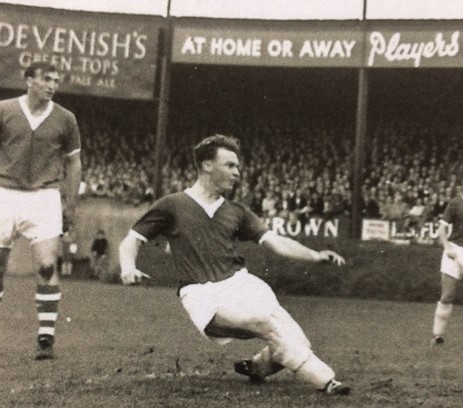In this series, Charlie Howell builds a squad of City Centurions, taking a look at each player’s career issue-by-issue, with Hall of Fame member Graham Rees the latest to feature.
Ferenc Pukas was the Messi or Ronaldo of his generation. Scoring over 500 goals in almost as many matches for Budapest and the mighty Real Madrid, he was the first proper Galáctico and kicked off an era of European dominance for the Spanish capital side. Impressive right? Well, according to the late, great, World-Cup winner Nobby Stiles, Pukas had nothing on Exeter City’s Graham Rees.
It was a chilly Wednesday evening in October 1960 when Stiles’ Manchester United travelled down to Devon for a League Cup tie against a plucky fourth tier Exeter side that the Red Devils assumed would be a straight and easy win. Unfortunately for them, City’s striker Graham had other ideas and Matt Busby’s side was held to a 1-1 draw with Stiles being given what he later described as ‘the most difficult chasing of my career’.
While United were stunned, Grecian fans who packed out the park that day had come to expect this type of performance from Graham as he had been doing the same to fourth tier sides for years.
Graham was one of a number of players who were spotted playing youth football in south Wales during the early 1950s and, after impressing on trial, City’s gaffer Norman Dodgin personally drove over the border to the meet with the young forward’s parents to convince them to let sign a professional deal with City on his 17th birthday.
After making his debut in a 3-0 defeat at Norwich, the forward quickly sealed a regular first team spot while gaining the attention of the Welsh national team, being called up to make appearances for their youth sides.
Amazingly, 23 goals in 1958/59 wasn’t enough to see Graham crowned the Grecians’ top scorer as striking partner Ted Callard tipped him to the crown with a return of 27. A gutting 3-0 loss to Shrewsbury meant that the Blues tipped City to promotion by just a single point but that only motivated Graham, and he went on to be City’s top scorer for the next two seasons.
Five years after missing out by a point, City were finally promoted to the Third Division, this time sneaking in by just two points and Graham finally got his chance at a higher level.
Unfortunately for City, all didn’t go to plan in Division Three and after two seasons the club was relegated, with Graham being released at the end of that season.
After he left Exeter, fourth tier defences breathed a sigh of relief as Graham dropped down into non-league before eventually retiring in 1971.
